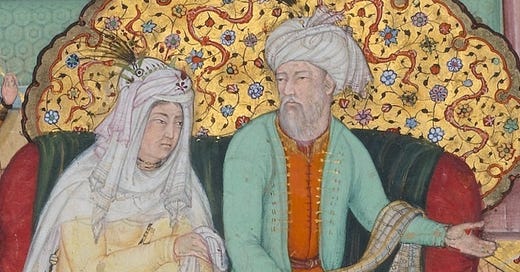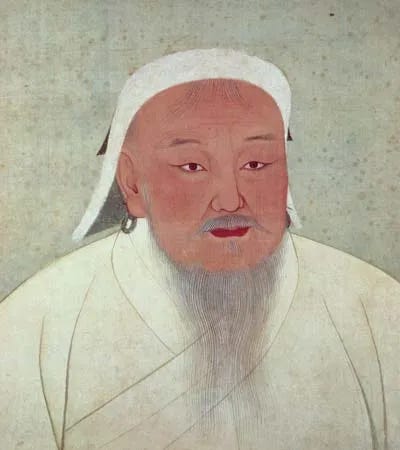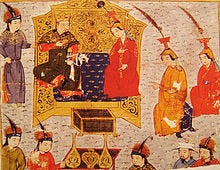Borte; The Eternal Flame of Genghis Khan
In the year 1173, a ten-year-old Mongol girl named Börte was betrothed to Temüjin, the future Chinggis (Genghis) Khan.
Börte, whose name translates to “blue-grey” or “celeste” married Temüjin five years later, becoming his first wife. The union enabled Temüjin’s political career to take off. Börte’s family was a particularly respectable one and her dowry included a valuable sable coat that Temüjin would later use to gain the favour of the khan of the Keraites, who would prove to be a powerful ally.
Börte and Temüjin soon started family and set out to build their life together. However, several years into the marriage Börte was abducted by members of the Merkit Tribe. It turns out the kidnappers held a grudge against Temüjin’s father Yisügei. Some versions of the story say that Börte was forced into a marriage with a Merkit man who impregnated her, some versions suggest she was already pregnant when she was captured. After several months Temüjin was able to rescue his wife and her unborn child, a boy who she would call Jochi. After their rescue and return home, Jochi was accepted as Temüjin’s son and Börte retook her place as the first, or senior wife. In this role, Börte was in a position of great influence and her four sons, Jochi, Chagatai, Ögedei, and Tolui were prioritized in the line of succession. Börte was instrumental in securing tribal alliances for Temujin early on. The Onggirat tribe, to which Börte belonged, was powerful and respected among the Mongols. Her marriage to Temujin not only provided him with a valuable alliance with her tribe, but it also brought loyalty from other clans linked to her family.
Temüjin was proclaimed Genghis Khan (meaning "Universal Ruler") in 1206 at a kurultai (a grand assembly of Mongol chieftains). This event marked his formal rise to power as the leader of the Mongol tribes, uniting them under one banner for the first time in history.
From there, he began his conquests, creating one of the largest empires the world has ever seen, however, he depended on Börte to manage his affairs at home. She was in control of the junior wives, concubines, servants, and members of the royal guard, which meant that at any given time she was responsible for up to one thousand other people.
Börte often managed the domestic affairs of the empire, especially during the times her husband was away on campaign. She dealt with tribal leaders, handled disputes among clans, and helped maintain peace within the Mongol heartlands. She managed her husband’s camp and his animals, bore him nine children in total, and is credited with influencing how her famous warrior husband viewed women in general. Genghis Khan is often noted for giving women, especially his wives and daughters, significant responsibilities and privileges, far more than many other rulers of his time. Börte’s strength and loyalty might have shaped his progressive view that women could govern, lead, and make important decisions, which was reflected in how he treated other women in his family. His daughters, for instance, were given governance over vast territories, which was rare for that era.
Börte is believed to have had a significant influence on the development of the Yassa, the legal code attributed to Genghis Khan. Some scholars suggest that Börte’s input helped shape certain aspects of this code, particularly regarding the protection of women, families, and property rights. One story often told is how Börte was always in the background, exerting a quiet but powerful influence on Genghis Khan’s decisions. Despite the growing empire and the pressures of governance, Genghis Khan would reportedly return to Börte for advice and counsel. Important meetings and negotiations took place in her tent, it was her family that supported his political and military pursuits. Her opinions were valued, and she was one of the few people who could openly disagree with him.
Börte’s reputation, particularly for her loyalty and resilience, became a symbol of ideal Mongol womanhood. Her life reflected the traditional Mongol values of strength, endurance, and family loyalty. In Mongol culture, where women had a relatively high status compared to other societies of the time, Börte was seen as embodying the virtues expected of noblewomen. Her ability to survive hardship, manage domestic affairs, and give birth to four sons who would go on to shape the Mongol Empire further solidified her importance in Mongol history. As Genghis Khan expanded his empire, Börte’s influence remained strong. She is often remembered for her loyalty and dedication to her husband, as well as her role in securing his early rule. Her ability to secure alliances and maintain peace within the family despite challenges like Jochi’s disputed paternity helped Genghis Khan solidify his power base.
When Börte passed away in 1230, Genghis Khan was reportedly overcome with grief. Accounts from sources like "The Secret History of the Mongols" suggest that he held elaborate mourning rituals to honor her memory. In keeping with Mongol traditions, he likely organized lavish funeral rites that involved sacrifices, feasting, and solemn ceremonies. As a symbol of his love and respect for Börte, it is believed that Genghis Khan took a period of introspection and may have isolated himself temporarily to process his loss.
This mourning period was significant because Börte had been with Genghis Khan from the beginning of his rise to power, sharing the hardships and triumphs of his life. Her death marked the loss of one of the most stabilizing figures in his personal and political life, and it undoubtedly left an emotional void in his later years.







